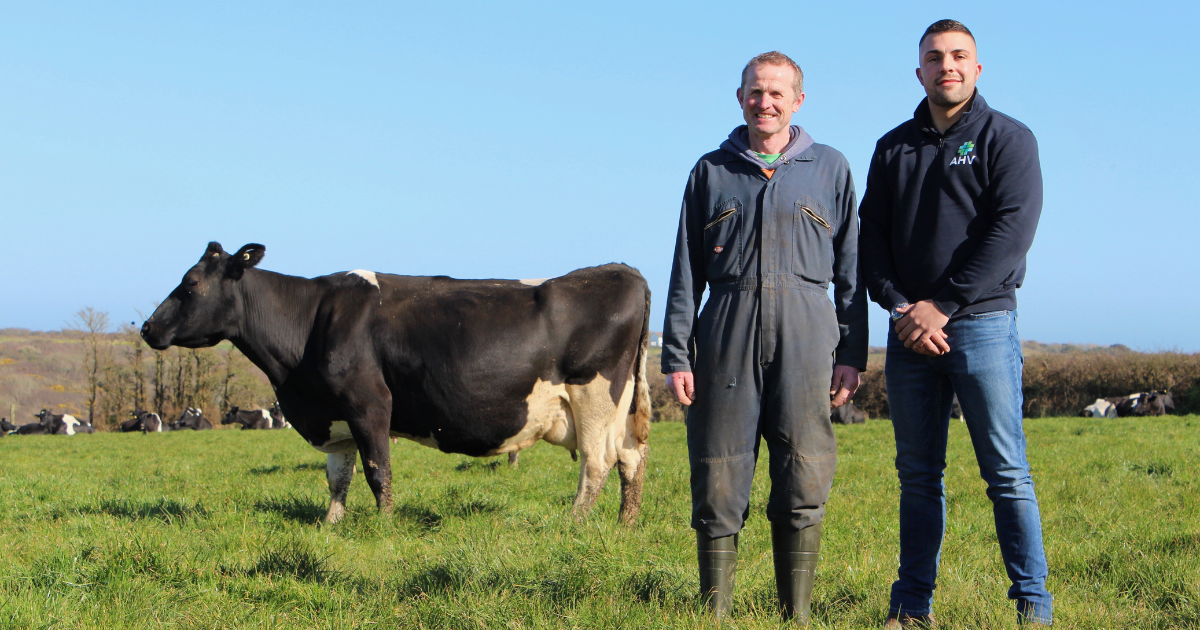
Cornish dairy farmer ‘quenches’ animal health challenges
One Cornish dairy farmer is embracing a new approach to udder health which focuses on disrupting the way bad bacteria communicate with each other, whilst supporting the cow’s natural immune system.
In March 2021, Kevin Tripconey started using Animal Health Vision’s (AHV) range of products and solutions, designed around Quorum Sensing (QS). He wanted to step away from traditional methods for managing udder health, in light of pressure on the dairy industry to use medicines responsibly.
Quorum Sensing is how bacteria communicate with each other in order to come together and form a group or “army” which is more effective at attacking the host. Through communication, they also create a biofilm around themselves as protection from the animal’s immune system.
AHV’s technology is designed to disrupt this Quorum Sensing pathway, using processes such as “Quorum Quenching” (QQ). By blocking the bacteria’s signal receptors, they are unable to communicate and collaborate. This results in the breakdown of the biofilm, so the cow’s own immune system can act on the undesirable bacteria.
Now, rather than immediately reaching for traditional methods for tackling udder health, Mr Tripconey chooses to use AHV’s products as soon as issues are flagged up via milk recording or milk conductivity readings.
This may include using an EXTRA and/or QUICK bolus using QQ. The complementary product, ASPI is also given to help support the cow in cleansing her udder, easing discomfort and getting her back on her feet and back at the feed fence.
Mr Tripconey, who milks 160 British Friesians at Great Arrowan Farm in Helston, has noticed cows are being supported better in their recovery and udder health issues are tending to recur less - something a third of cases were doing previously.
He said: “Eighty percent of severe cases get better quicker without any question. It’s very noticeable how quick they respond.”
With AHV’s products, cows remain in production, which means milk is going in the tank quicker, compared to when using more traditional routes of tackling udder health.
Mr Tripconey added: “You can have a cow with udder health challenges, and therefore yield losses, and within a few days of giving the AHV products, the milk looks fine so you’re getting milk back in the tank quicker, even on these severe cases.”
The fact the biofilm surrounding the bacteria is being eradicated is the reason Mr Tripconey has also seen a reduction in recurrence. When the biofilm is present, the animal’s immune system does not recognise it as foreign and consequently does not attack.
AHV’s Technical Consultant Ben Corser said: “During calving or weaning, or any other stressor, the bacteria sense it is the right time for them to disperse from this biofilm and challenge the cow. That’s often the reason that udder health challenges reoccur.
“By using our knowledge of Quorum Sensing, we can work proactively to help the cow tackle the challenge from within. It’s an approach that’s already proving popular with farmers across the world with over 10,000 farmers already using the AHV range.”
Mr Tripconey has reduced the use of his traditional methods for udder health management by 68%. He admits it’s taken time to gain confidence in the new approach and admits, with a little more patience, he could have stepped even further away from traditional routes of udder health management. “I was a little sceptical to start with, but so far so good. It definitely works,” he said.
Mr Tripconey has also started using AHV’s Fertility Program when dealing with retained placentas after calving. He administered an AHV bolus to two cows that had given birth to twins and was impressed by the results. “I gave them a METRI bolus to stimulate uterine contractions and the placenta came away within 24 hours. Both appeared to be clean,” he said. “This meant veterinary intervention was not needed.”
All-in-all he would recommend other farmers adopt the new approach. “I’d say give it a go without question, but you need to have the right mindset and the confidence with it to give it a fair chance,” he said.
Mole Valley Farmers is the sole distributor of AHV products in England and Wales. Call 028 8554 9600 for more information









